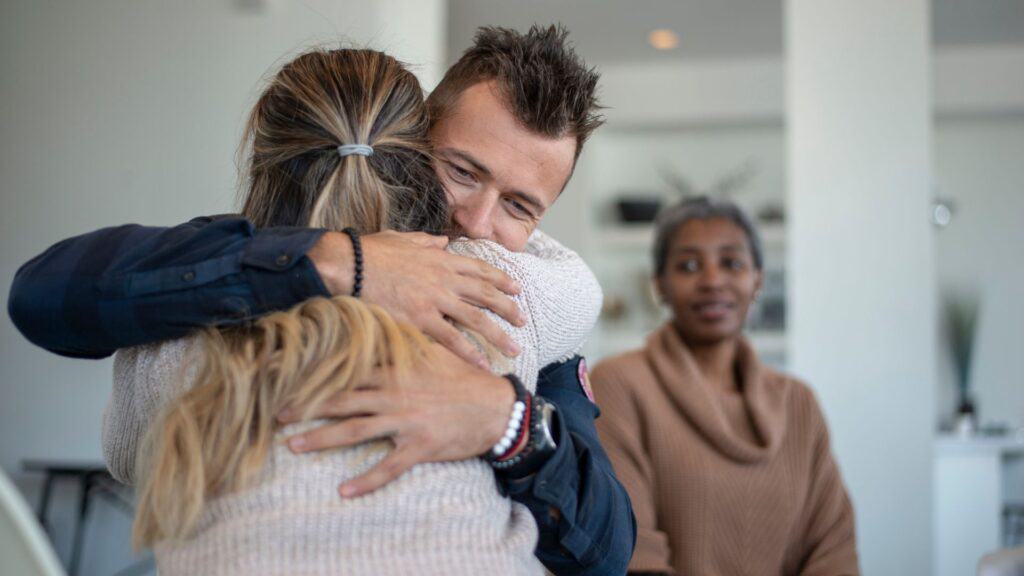When facing challenges like addiction or mental health issues, the effects are rarely confined to just one individual. Often, the entire family unit feels the weight of these struggles. Family therapy provides a space where all members can come together, share their perspectives, and work toward a healthier, more supportive dynamic. At The Lovett Center, we specialize in family therapy in Houston, guiding families through difficult times with empathy, expertise, and care.
What is Family Therapy?
Family therapy or family counseling, is a type of psychotherapy, involves family members in the treatment process. Rather than focusing solely on the individual experiencing addiction or mental health issues, this therapeutic approach considers the family as a whole system. The goal is to improve communication, resolve conflicts, and strengthen the family’s ability to support one another.
For those wondering, what is family therapy for addiction? It focuses on understanding how family dynamics contribute to substance use, and how the family can collectively support recovery. Sessions involve all family members or just those willing to participate, depending on what works best for the specific situation.
How Does Family Counseling in Houston, TX Work?
Family therapy is designed to be a collaborative process. The therapist facilitates discussions, encourages open communication, and helps family members express their thoughts and feelings in a safe and constructive environment. To understand how does family therapy work, it’s helpful to know that the process typically unfolds over several stages:
- Assessment and Goal Setting: The initial sessions focus on understanding the family dynamics, identifying issues, and setting therapy goals. This stage is crucial for tailoring the therapy to meet the specific needs of the family.
- Intervention: During the intervention phase, the therapist introduces techniques and strategies to address the identified issues. This could involve role-playing exercises, communication skills training, or exploring past events that have shaped the family’s current dynamics.
- Maintenance and Support: As therapy progresses, the focus shifts to maintaining the changes and ensuring the family has the tools and strategies needed to support one another moving forward. Regular check-ins or follow-up sessions might be recommended to reinforce the progress made.
 Family Therapy Topics
Family Therapy Topics
The topics discussed during family therapy in Houston vary widely depending on the family’s unique situation and needs. Some common topics include:
- Communication Issues: Improving how family members talk to and understand each other.
- Conflict Resolution: Learning healthy ways to manage disagreements and reduce tension.
- Setting Boundaries: Establishing clear and healthy boundaries to prevent misunderstandings and overstepping.
- Parenting Challenges: Addressing issues related to raising children, especially in stressful or complex situations.
- Coping with Addiction: Understanding how alcohol and drug addiction affects the family and finding ways to support recovery.
- Managing Mental Health: Supporting a family member with mental health issues while maintaining the well-being of the entire family.
These family therapy topics are explored through various therapeutic techniques, all aimed at fostering understanding, empathy, and cooperation within the family.
What to Expect in Family Therapy
It’s normal to feel apprehensive about starting family therapy, especially if you’re unsure what to expect. Here’s a brief overview to help ease any concerns:
- A Safe and Neutral Environment: Family therapy sessions provide a confidential and neutral space where everyone can speak openly without fear of judgment or repercussions.
- Active Participation: We encourage all family members to participate actively, sharing their thoughts and feelings. The therapist guides the conversation to ensure that everyone’s voice is heard.
- Emphasis on Communication: One of the main focuses will be improving how family members communicate with each other. This involves not only talking but also listening and understanding.
- Structured Sessions: Typically, therapists structure sessions around specific goals and objectives, ensuring that the family is making progress toward their desired outcomes.
- Supportive Guidance: The therapist’s role is to guide the discussion, provide insights, and help the family navigate complex emotions and situations.
Benefits of Houston Family Therapy
Choosing family therapy in Houston offers numerous benefits, particularly when facing the challenges of addiction and mental health. Here are some key advantages:
- Strengthened Relationships: Family therapy helps to rebuild and strengthen relationships that may have been strained by addiction or mental health issues. Also, it encourages open dialogue and mutual understanding, paving the way for healthier interactions.
- Improved Communication: Many families struggle with communication. Especially, when emotions run high. Therapy provides tools and techniques to enhance communication. Thus, ensuring that family members feel heard and understood.
- Better Coping Strategies: Through family therapy, families learn healthier ways to cope with stress, conflict, and emotional pain. This can be particularly valuable when dealing with the aftermath of addiction or the ongoing challenges of mental health issues.
- Enhanced Support System: By involving the entire family in the therapeutic process, family therapy fosters a stronger support system for the individual in treatment. This can be crucial for long-term recovery and mental health maintenance.
- Tailored Approach: Every family is unique, and family therapy is designed to be flexible and tailored to the specific needs and dynamics of your family. This personalized approach ensures that the therapy is relevant and effective for your situation.
Family Therapy for Addiction
Addiction doesn’t just affect the individual; it impacts the entire family. The Substance Abuse and Mental Health Services Administration (SAMHSA) recognizes family therapy as a critical component of comprehensive treatment to give individuals the best chance for lasting recovery. Through family therapy, families can better understand the nature of addiction, how it affects relationships, and how they can best support their loved one’s recovery.
In these sessions, the therapist explores the family’s role in the addiction, whether as a contributing factor or as a support system. The focus is on breaking unhealthy patterns, addressing enabling behaviors, and fostering a supportive environment conducive to recovery. This type of therapy can be transformative, helping families rebuild trust, heal past wounds, and move forward together.
The Lovett Center: Your Partner in Healing
At The Lovett Center, we understand the complexities and challenges that families face when dealing with addiction or mental health issues. Accordingly, our approach to family therapy in Houston is compassionate, personalized, and grounded in evidence-based practices. We are committed to helping families heal, rebuild, and move forward with strength and resilience.
Our therapists are experienced in working with diverse family dynamics and are dedicated to creating a supportive and non-judgmental environment. Whereas, all family members can feel safe and heard. We work collaboratively with families in all of our programs to develop strategies and solutions that promote healing and growth.
FAQs
1. What is the main goal of family therapy?
The main goal of family counseling is to improve the overall functioning of the family by addressing communication issues, resolving conflicts, and fostering a supportive environment. It strengthens relationships and enhances the family’s ability to support one another.
2. How long does family therapy typically last?
The duration of family counseling varies depending on the specific needs and goals of the family. It ranges from a few sessions to several months, with each session typically lasting about 60 to 90 minutes.
3. Is family therapy effective for addiction treatment?
Yes, family counseling is highly effective for drug and alcohol addiction treatment. It helps to address the underlying family dynamics that may contribute to substance use and fosters a supportive environment for the individual in recovery.
4. Can family therapy be beneficial even if only some family members participate?
Yes, family counseling can still be beneficial even if not all family members are able or willing to participate. The therapy can be tailored to the participants, and positive changes in the involved members can still have a ripple effect on the entire family.
5. What should we expect in the first session?
In the first session, the family therapist will typically gather information about the family’s history, dynamics, and the issues they want to address. This session is also an opportunity to set goals and establish a collaborative approach to therapy.
By knowing what to expect in family therapy, families can enter the sessions with clear goals and a sense of purpose. Therefore, making the therapy more effective.
6. Is family therapy covered by insurance?
Family therapy coverage varies depending on the insurance provider and the specific policy. It’s advisable to check with your insurance provider to understand your coverage options.
 Get Started with Family Therapy in Houston Texas Today
Get Started with Family Therapy in Houston Texas Today
If you’re ready to take the first step toward healing and strengthening your family, we’re here to help. Family therapy offers a pathway to better communication, stronger relationships, and a more supportive environment for everyone involved.
Whether you’re dealing with addiction or mental health disorders, or just need to improve family dynamics, our family therapy in Houston can provide the tools and guidance you need.
Reach out to The Lovett Center today to learn more about our Houston family therapy services and to schedule an initial consultation. Together, we can work toward a brighter, healthier future for you and your family.


